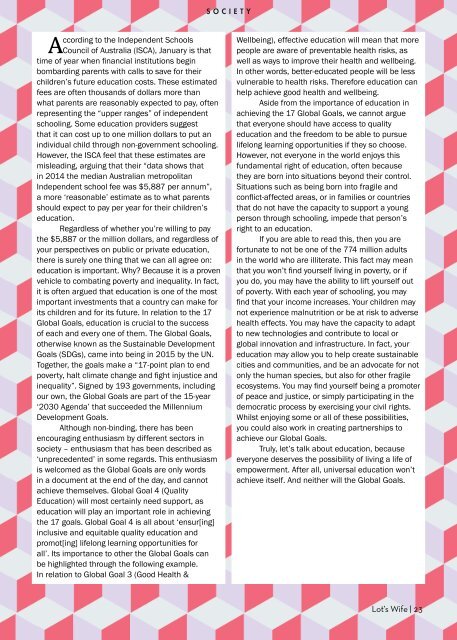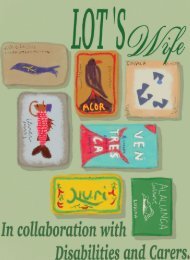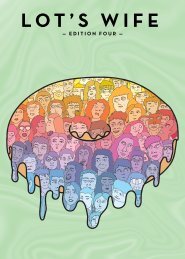Lot's Wife Edition 1 2016
You also want an ePaper? Increase the reach of your titles
YUMPU automatically turns print PDFs into web optimized ePapers that Google loves.
SOCIETY<br />
According to the Independent Schools<br />
Council of Australia (ISCA), January is that<br />
time of year when financial institutions begin<br />
bombarding parents with calls to save for their<br />
children’s future education costs. These estimated<br />
fees are often thousands of dollars more than<br />
what parents are reasonably expected to pay, often<br />
representing the “upper ranges” of independent<br />
schooling. Some education providers suggest<br />
that it can cost up to one million dollars to put an<br />
individual child through non-government schooling.<br />
However, the ISCA feel that these estimates are<br />
misleading, arguing that their “data shows that<br />
in 2014 the median Australian metropolitan<br />
Independent school fee was $5,887 per annum”,<br />
a more ‘reasonable’ estimate as to what parents<br />
should expect to pay per year for their children’s<br />
education.<br />
Regardless of whether you’re willing to pay<br />
the $5,887 or the million dollars, and regardless of<br />
your perspectives on public or private education,<br />
there is surely one thing that we can all agree on:<br />
education is important. Why? Because it is a proven<br />
vehicle to combating poverty and inequality. In fact,<br />
it is often argued that education is one of the most<br />
important investments that a country can make for<br />
its children and for its future. In relation to the 17<br />
Global Goals, education is crucial to the success<br />
of each and every one of them. The Global Goals,<br />
otherwise known as the Sustainable Development<br />
Goals (SDGs), came into being in 2015 by the UN.<br />
Together, the goals make a “17-point plan to end<br />
poverty, halt climate change and fight injustice and<br />
inequality”. Signed by 193 governments, including<br />
our own, the Global Goals are part of the 15-year<br />
‘2030 Agenda’ that succeeded the Millennium<br />
Development Goals.<br />
Although non-binding, there has been<br />
encouraging enthusiasm by different sectors in<br />
society – enthusiasm that has been described as<br />
‘unprecedented’ in some regards. This enthusiasm<br />
is welcomed as the Global Goals are only words<br />
in a document at the end of the day, and cannot<br />
achieve themselves. Global Goal 4 (Quality<br />
Education) will most certainly need support, as<br />
education will play an important role in achieving<br />
the 17 goals. Global Goal 4 is all about ‘ensur[ing]<br />
inclusive and equitable quality education and<br />
promot[ing] lifelong learning opportunities for<br />
all’. Its importance to other the Global Goals can<br />
be highlighted through the following example.<br />
In relation to Global Goal 3 (Good Health &<br />
Wellbeing), effective education will mean that more<br />
people are aware of preventable health risks, as<br />
well as ways to improve their health and wellbeing.<br />
In other words, better-educated people will be less<br />
vulnerable to health risks. Therefore education can<br />
help achieve good health and wellbeing.<br />
Aside from the importance of education in<br />
achieving the 17 Global Goals, we cannot argue<br />
that everyone should have access to quality<br />
education and the freedom to be able to pursue<br />
lifelong learning opportunities if they so choose.<br />
However, not everyone in the world enjoys this<br />
fundamental right of education, often because<br />
they are born into situations beyond their control.<br />
Situations such as being born into fragile and<br />
conflict-affected areas, or in families or countries<br />
that do not have the capacity to support a young<br />
person through schooling, impede that person’s<br />
right to an education.<br />
If you are able to read this, then you are<br />
fortunate to not be one of the 774 million adults<br />
in the world who are illiterate. This fact may mean<br />
that you won’t find yourself living in poverty, or if<br />
you do, you may have the ability to lift yourself out<br />
of poverty. With each year of schooling, you may<br />
find that your income increases. Your children may<br />
not experience malnutrition or be at risk to adverse<br />
health effects. You may have the capacity to adapt<br />
to new technologies and contribute to local or<br />
global innovation and infrastructure. In fact, your<br />
education may allow you to help create sustainable<br />
cities and communities, and be an advocate for not<br />
only the human species, but also for other fragile<br />
ecosystems. You may find yourself being a promoter<br />
of peace and justice, or simply participating in the<br />
democratic process by exercising your civil rights.<br />
Whilst enjoying some or all of these possibilities,<br />
you could also work in creating partnerships to<br />
achieve our Global Goals.<br />
Truly, let’s talk about education, because<br />
everyone deserves the possibility of living a life of<br />
empowerment. After all, universal education won’t<br />
achieve itself. And neither will the Global Goals.<br />
Lot’s <strong>Wife</strong> | 23

















